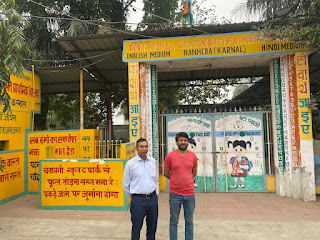मैंने बचपन से अपनी दीदी को देखा
उसको मालूम था कि दो छोटे भाइयों को कैसे पालना है।
कब किसको लताड़ना है , किसे पुचकारना है।
चोट लगे खेल में तो गेंदे का रस कैसे ढारना है
और पीकर आए हो बाबूजी तो जूते कैसे उतारना है।
मेरी दीदी को मेहमान बढ़ जाने पर चार कप चाय को
छः बनाने का हुनुर मालूम था।
और लिट्टी बनाते हुए, उसमे
भुट्टे भुनाने का गुर भी उसका बहुत खूब था।
मेरी दीदी क्या खूबसूरत थी
हिमालय जैसे उसकी नाक थी
और रंग उसका सुंदरबन में छनती हुई धुप था
सुबह जब हल्दी का उबटन लगाती थी
तो लगता था कनइल का फूल है
शाम को जब दिया जलाएगी
तो मिस्टी मिलेगी ये मुझे मालूम था।
लेकिन एक दिन मेरी दीदी, दीदी से औरत हो गई
अब उस औरत से बहुत दूर था
जिसका कभी मैं कभी आखो का नूर था।
अब घर में गंदले मोज़े मिलते थे
रुमाल सारे गुम थे, आलू में नमक तेज था
रोटिया कच्ची थी, कमिजो में बटन नहीं थे
तकिये में कवर नहीं था, गद्दों में खटमल मौजूद थे
जहाँ गयी थी वो औरत वहां बताते है पिताजी
कि उसका बड़ा रसूख था।
मै सोचता था कि कितना कमीना है वो मुच्छड़
जिसने मेरी दीदी को धोखेबाज बना दिया।
खैर ढेड साल बाद मुझे बताया गया कि मेरी एक भगिनी हुई है।
मेरी दीदी को एक लड़की हुई है तो मै उससे मिलने गया
लेकिन वहां दीदी थी ही नहीं
वहां एक औरत थी,
जिसकी आखों के निचे गढ्ढ़े थे
होठ पर पपड़ियाँ थी
और मॉस बस नाम का मौजूद था
उस औरत की दुनिया थी
उसकी सास
जिसको नहाने के लिए गरम पानी चाहिए
ननद जिसको दुपट्टा आसमानी चाहिए
बूढ़े ससुर
जिसको चाय और हुक्का चाहिए
और एक पति जिसको
ऑफिस के लिए दाना पानी चाहिए
ऐसा लगता था की सबको बस
उसकी जवानी चाहिए।
वो औरत मुझे कमरे के कोने में ले जाकर खूब रोइ
फूट फूट कर रोइ।
मै वापस आ गया
और दो महीने बाद मेरी दीदी को जला दिया गया।
मेरे मज़बूर पिता ने केस चला दिया
और उस केस का बड़ा फायदा रहा
उससे एक वकील का घर चलता रहा
थानेदार को नोटों का बण्डल मिलता रहा
सिविल सर्जन को मिठाइयों का डोला पहुचता रहा।
और मुझे बताया गया की मेरी दीदी बदचलन थी।
लेकिन वो बदचलन कैसे थी ये मुझे पता नहीं चला
क्योंकि उसे मैंने घर के बहार छोड़ियें घर के अंदर भी चलते नहीं देखा
वो तरकारी काटती थी तो बैठकर
कपडे धोती थी तो बैठकर
पोंछा लगाती थी तो बैठकर
तो उसने चलना कब सीखा और उसका चल चलन कैसे ख़राब हुआ ?
Shakti Hiranyagarbha

